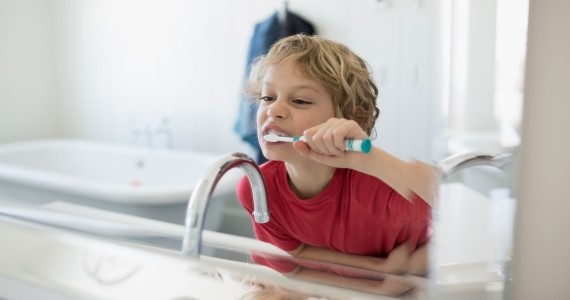Early Childhood Caries (Tooth Decay or Cavities)
Protect your baby from Early Childhood Caries.

How Serious is Early Childhood Caries and What Contributes to This Disease?
- Babies and young children who nap or sleep at night with a bottle containing anything but plain water are at risk of developing early childhood caries.
- Even liquids that are good for the baby, such as milk, formula and fruit juices, all contain natural sugars that can cause tooth decay.
- Early childhood caries most often occurs in the upper front teeth, but other teeth may be affected as well.
- Toothaches caused by decay can affect the child's eating, chewing and therefore their nutrition.
- By the time a parent notices the decay, it may be too late to save the teeth.
- Baby teeth are also important placeholders in the jaw for the adult teeth.
- If a baby tooth is lost too early, the adjacent baby teeth may drift into the empty space causing the adult teeth to come in or erupt in a crooked or crowded manner.
- Remember that giving a child a bottle of sweetened liquid many times a day, and especially at naptime or nighttime, can cause harm to your child's teeth.
What is Early Childhood Caries?
As soon as your baby's first teeth appear, usually around age six months, they are susceptible to decay. Early childhood caries,formerly called nursing bottle caries, baby bottle syndrome or baby bottle tooth decay, occurs when sugary liquids pool around an infant's or toddler's teeth and gums for long periods. Bacteria use the sugar to produce acids that cause decay. When babies are given a bottle of milk, formula or juice at bedtime as a sleep aid, that's when trouble can start. Over time, this can lead to cavities and painful toothaches.
By spending a few minutes each day to care for your baby's teeth, you can help ensure a healthy start for your baby's oral health and smile
How Can You Prevent Early Childhood Caries?
- Starting at birth, clean your baby's gums with a soft cloth or gauze pad after each feeding. This process becomes a normal, daily routine for your baby and begins to get them used to cleaning their mouth.
- Begin brushing your baby's teeth with a small soft toothbrush or gauze as soon as the first tooth erupts, usually around six months. Continue cleaning the gums in the toothless areas.
- Resist the temptation to allow your child to fall asleep with a bottle containing a sweet liquid. Pass this advice along to grandparents and other caregivers.
- If your child needs comforting between regular feedings, at night or naptime, fill a bottle with cool water or give your child a clean pacifier. Never give your child a pacifier dipped in anything sweet.
- Encourage your child to drink from a cup by their first birthday.
- Start regular dental visits when the child's first tooth erupts, or no later than the child's first birthday. If you think there might be a dental problem, visit a dentist right away.
- Decay-fighting fluoride in the water supply is important for teeth throughout a person's lifetime. If your local water supply does not contain fluoride, ask your dentist if your child should be provided a dietary fluoride supplement.
Baby your baby's teeth. Children need strong, healthy teeth to chew, speak, for proper nutrition and for an attractive smile. Protecting your child's baby teeth can also help ensure a good-looking adult smile.
Note: The information in this document is not meant to replace the advice of your dentist or another licensed healthcare professional. Talk to your dentist for any specific dental advice.
Sources: American Dental Association: www.ada.org; American Academy of Pediatric Dentistry: www.aapd.org;






